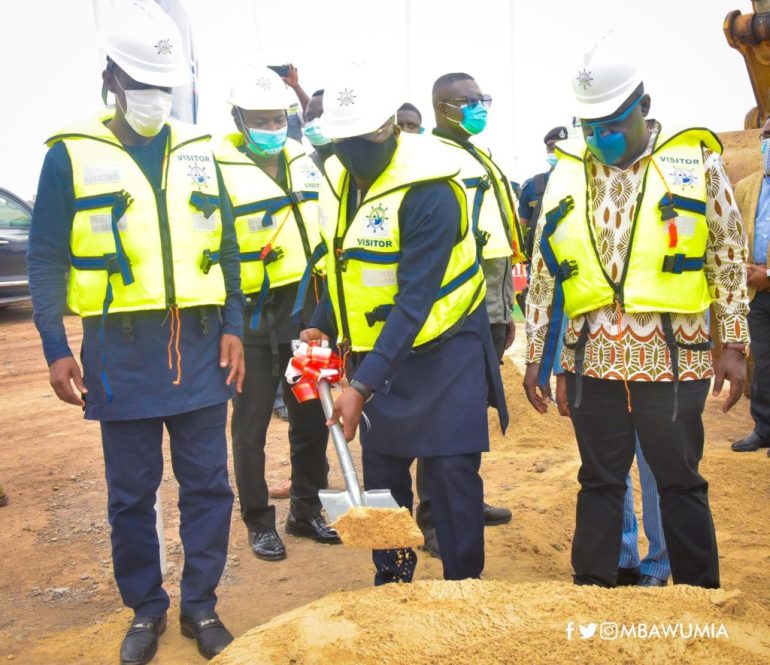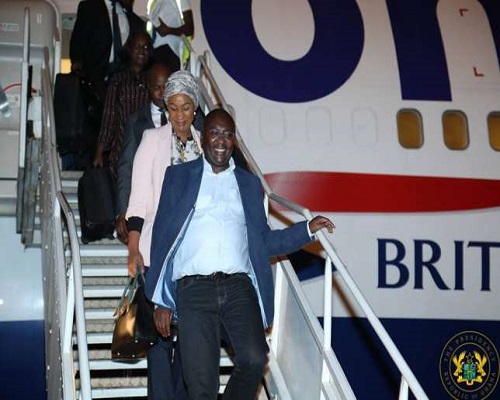Veep Bawumia inaugurates new terminal, interchange at Takoradi
- Posted on
- Comment

The Vice-President, Dr Mahamudu Bawumia, has inaugurated a new terminal at the Takoradi Harbour to provide essential linkages in the oil and gas supply chain sector.
The facility was built by Ibistek Ghana Limited through Marshalls Oil Service, a special purpose vehicle with the capacity to discharge 80,000 tonnes of liquid cargo (oil) per stream a day at the port.
The Ghana Infrastructure Investment Fund (GIIF) and Consolidated Bank Ghana (CBG) financed the project at a cost of $56 million.
Dr Bawumia also cut the sod for the construction of the first three-tier road intersection in Takoradi at the PTC/Kwame Nkrumah roundabout.
Jetty
The Liquid Bulk Terminal has a draft of 14 metres and can handle bulk fuel carrier vessels weighing 60,000 tonnes.
It has five separate loading arms that will allow for the discharge of finished petroleum products, including diesel, gasoline, liquefied petroleum gas (LPG), heavy fuel oil (HFO) premium motor spirit (PMS) as well as bitumen from vessels.
The terminal also has a modern control room that will serve as a command centre to manage product discharge operations on the jetty automatically.
There is, in addition, a 10-metre high fire monitor for fighting fire both at the loading arms and the discharging vessels.
Revenue, employment
At the inauguration of the terminal at the Takoradi Harbour yesterday, the Vice-President said apart from providing a platform for revenue mobilisation, the country’s ports also offered employment to many Ghanaians.
He said the government placed emphasis on promoting a business-friendly environment, as was exemplified in services the ports rendered to neighbouring landlocked countries such as Burkina Faso, Mali and Niger.
“Government has spared no effort over the past few years to heighten development and expansion of the physical infrastructure at the ports and has deployed modern operational equipment, and sharpened the human resource capacity of the workforce to efficiently manage our maritime facilities,” Dr Bawumia said.
He said the ongoing multipurpose container terminal being built by Ibistek, as well as other initiatives such as the Oil Services Hub project, for which contractual works were at the procurement stage, were geared towards ensuring that the port infrastructure was resilient and could promote trade effectively and efficiently.
Partnerships
Dr Bawumia also cut the sod for the phase two of the project and stressed that the project as well as others initiated by Ibistek were a demonstration of the partnership that existed between the government and the private sector.
The second phase involves the construction of a Dry Bulk Terminal to facilitate the export and import of bulk cargo such as bauxite, manganese and clinker.
The Minister of Transport, Mr Kwaku Ofori Asiamah, said: “The government’s plan is to position the Takoradi Harbour as a major hub of oil and gas in the West African sub-region and we are determined to do this in order to accelerate growth in the sector.”
For his part, the Western Regional Minister, Mr Kwabena Okyere Darko, said the money was being sunk to develop the region with the aim of having the local people to own the local economy and create jobs that were sustainable for the youth.
The Chairman of the Board of Directors of the Ghana Ports and Harbours Authority (GPHA), Mr Peter Mac Manu, said upgrading and expansion of infrastructure at the Takoradi and Tema ports began in 2011 as part of the national development and poverty alleviation agenda.
The Chairman of Ibistek, Mr Kwame Gyan, said when the terminal was completed and functional, it would adequately serve the Western and Western North regions which consumed in excess of 627,864 tonnes (15.46 per cent) of petroleum products.
“Ibistek has over some few years invested some $322.7 million in the Takoradi Port alone to improve its capacity for business,” he said.
PTC/Kwame Nkrumah Roundabout
Contractors working at the PTC/ Kwame Nkrumah Roundabout, have 30 months to turn the place into a three-tier interchange with direct access to the Takoradi Central Market (Market Circle).
Currently there is traffic congestion in the roundabout which distributes traffic in the city, especially during rush hours and, thus, the need for some expansion.
Urbanisation
The Vice-President said the rapid growth of the Sekondi-Takoradi metropolis had made the need for an interchange very vital.
He said there were other interchanges to be constructed in Sekondi-Takoradi, including one at the Paa-Grant Roundabout, but said that project could not be executed simultaneously as the one at the PTC roundabout due to the associated inconvenience it would cause the motoring public.
The Minister of Roads and Highways, Mr Kwasi Amoako-Attah, said bridges and other road infrastructure projects that were currently ongoing in the region would be completed on schedule.
A Divisional Chief in Takoradi, Osahene Katakyie Busumakora III, commended the government for the developments taking place in the region and called for support for the government for it to do more for the region.
-Graphic










 (Selorm) |
(Selorm) |  (Nana Kwesi)
(Nana Kwesi)